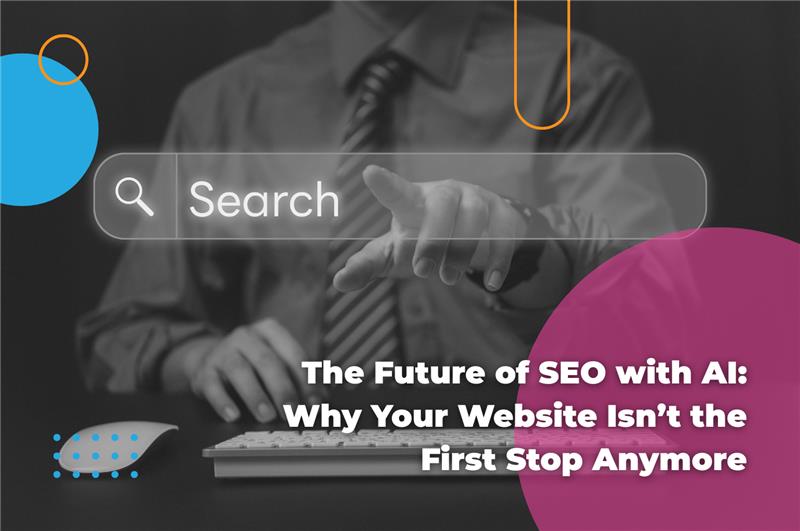The Future of SEO with AI: Why Your Website Isn’t the First Stop Anymore
July 20, 2025

Remember when being #1 on Google was the holy grail of digital marketing? Well, welcome to 2025, where the real battleground isn’t Google’s first page. It’s ChatGPT’s first response, Perplexity’s instant answer, or Google’s own AI Overview summary.
If you’re still optimising for search the old way with title tags, backlinks, and blog post volume, you’re already behind.
At Mango Technologies, we work with fast-moving SMEs across the UAE, Canada, and India. And lately, we’ve been having the same conversation again and again: “Why is our organic traffic down?” The answer is simple but uncomfortable.
AI search just ate traditional SEO.
Let’s break it down.
AI Search Isn’t Just a Trend - It’s the New Default
Search engines aren’t what they used to be. Users aren’t typing in keywords and clicking through 10 websites anymore. They’re having conversations with AI assistants. And these assistants - ChatGPT, Claude, Gemini, Perplexity - aren’t giving you a list of links. They’re giving direct answers.
According to data from Semrush and Similarweb, over 69% of all searches now end without a single website visit. That’s not a small shift. That’s a fundamental rewrite of how digital discovery works.
And it’s not just affecting B2C ecommerce brands. B2B companies, SaaS tools, service businesses – everyone is being filtered through AI-driven summaries and recommendation engines. If your brand isn’t being mentioned inside those summaries, you’re invisible.
So what does this mean for SEO?
From SEO to AIO: Optimising for AI Answers, Not Blue LinksTraditional SEO = Ranking on Google.
Modern SEO = Getting cited by AI engines.
Welcome to the age of Answer Engine Optimization (AEO) or Generative Engine Optimization (GEO). These are fancy new terms for a simple idea: your next customer won’t find you on page
1, they’ll find you inside an AI response.
Let’s say a business owner asks ChatGPT:
“What are the best CRMs for small teams in Dubai?”
Or a parent asks Perplexity:
“Best indoor play areas in Jumeirah for toddlers?”
If your brand doesn’t show up in the response, it doesn’t matter how good your blog or website is. Because the user never saw it.
How to Win in the AI-Search Era
This isn’t about gaming the system. AI models reward clarity, accuracy, and trust.
Here’s what actually works:
1. Structure Your Content Like Wikipedia, Not a Sales Page
AI models love clean hierarchy: H1s, H2s, concise paragraphs, factual tone. If your content looks like a marketing brochure, it won’t get cited. But you're in the game if it looks like a helpful explainer or buyer’s guide.
At Mango, we now rewrite client content using an internal framework called “AI Digestible Blocks”—think TL;DRs, definitions, pros/cons, comparisons—all laid out in clean, structured HTML.
2. Add Schema Markup and Product Data
Want AI to “understand” what you sell? Use structured data. Schema for FAQs, product specs, reviews, and business details gives AI crawlers a clearer view of what your business does, without relying on a human to interpret it.
3. Target Natural-Language Queries
Think beyond keywords. AI search isn’t “CRM Dubai.” It’s:
“Which CRM is best for a small business in Dubai?”
“Can I integrate Zoho with WhatsApp?”
“What’s the cheapest invoicing tool for freelancers?”
Write answers to these kinds of questions. That’s where the new discovery is happening.
4. Create Authority Hubs
Instead of dozens of short blogs, create deep pillar pages that position your brand as the authority on a niche topic. AI systems pull from authoritative content—not scattered posts.
For example, instead of 10 short blogs on SEO, create one long, structured, updated page:
“The Complete Guide to SEO for UAE Startups in 2025”
That’s the kind of content ChatGPT might reference directly.
The Rise of Agentic Shopping: Your Next Customer Might Be a Bot
Things are about to get even weirder.
With AI assistants like Copilot and Gemini integrating payment functionality, we’re now entering the era of agentic shopping, where an AI can not only research on your behalf but also place orders or make bookings for you.
Think:
- “Book the best salon near me with good reviews”
- “Order the most affordable kids' tablet with strong parental controls”
The AI doesn’t recommend five links. It picks one. It books it. It buys it.
In this future, your brand positioning must appeal to both humans and machines. That means prioritising:
- Accurate pricing
- Product availability
- Clear policies
- Up-to-date structured content
Forget emotional branding and hero images—AI cares about data, not vibes.
What Mango Recommends (If You Want to Stay Relevant)
At Mango Technologies, we’ve started building AI-first SEO playbooks for clients across industries. Here’s what we’re advising right now:
- Audit your website for AI-crawl readiness (structure, markup, clarity)
- Create a Content Map based on natural-language queries your customers actually ask
- Optimize for platforms beyond Google, like ChatGPT, Perplexity, Claude, Gemini
- Track AI mentions, not just backlinks or rankings
- Re-think attribution - use tools like PostHog or Plausible to monitor AI-driven sessions
Final Thoughts: You Don’t Need More Traffic. You Need Smarter Traffic.
The businesses that win in the next 12 months won’t be the ones with the most website visitors, they’ll be the ones showing up in the right places: inside AI-generated answers, voice assistants, and agentic recommendations.
Your content needs to evolve, your metrics need to shift, and your SEO strategy needs to adapt to the AI-first world.
And if you’re feeling overwhelmed? That’s exactly what Mango Technologies is here for.
Ready to optimize for the AI future?
Let Mango Technologies audit your content, rebuild your SEO strategy, and help you show up where it matters most - in the answers, not just the search results.
Reach out for a free discovery session. Your next customer isn’t Googling; they’re asking ChatGPT.
